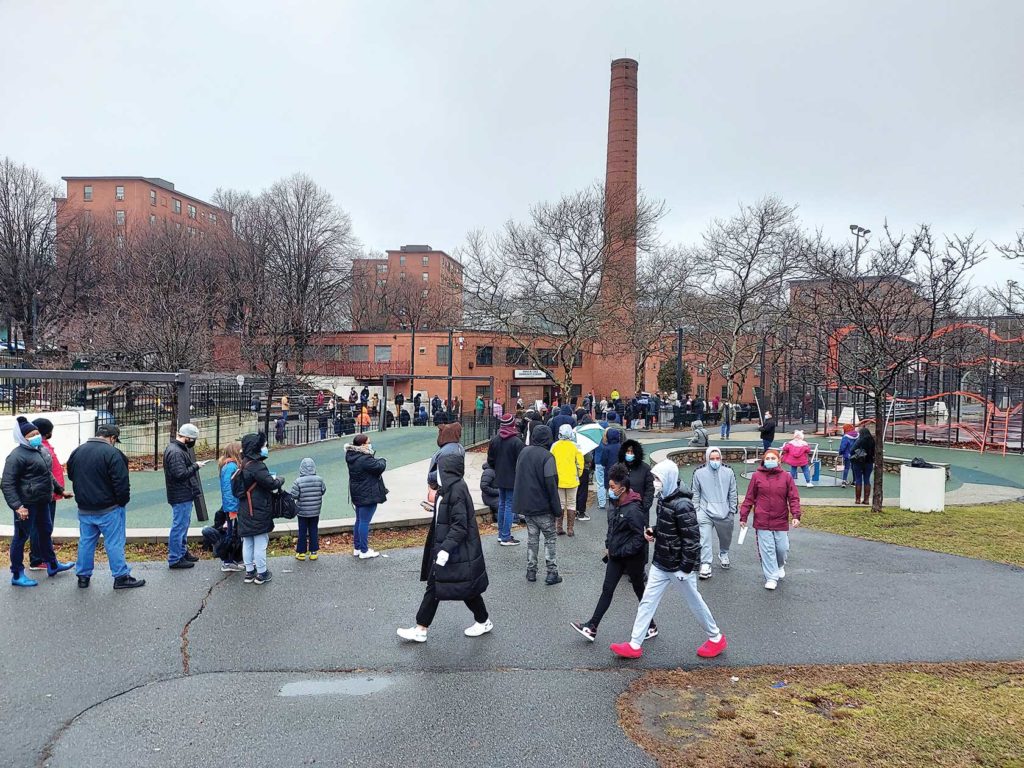City faces COVID testing conundrum
Long lines, short supply of at-home kits as many return to work, school

On Saturday, Boston residents waiting for COVID testing lined up in the rain in a line that stretched more than 200 yards from the community room at the Mildred Hailey Apartments, past the Jackson Square Orange Line station and up Centre Street.
The line, in which people waited more than three hours for a swab, was a scene that played out around the city and across the state as Massachusetts residents seeking the green light to return to work strained a testing system that was evidently inadequate.
“This is unacceptable,” Mayor Michelle Wu said Monday of the long lines for COVID tests. “There’s no reason why in this city people should be waiting for hours in the cold to do something that is necessary for their family’s health and safety.”
With more than 25,000 active cases across the city to start the week, Boston is continuing to see record-high single-day increases while residents have largely been unable to find at-home testing kits. At the same time, Governor Charlie Baker is doubling down on his message that Massachusetts is ahead of the curve with testing infrastructure and that residents need to continue to “be patient” as supply catches up to demand.
“People need to understand that they’re probably going to have to wait,” Baker said last week, adding that a major part of the problem was the federal government’s slow pace to deliver critical testing supplies to states.
In December, the Baker administration announced it would not be relying on Washington to provide tests, and instead would provide 2.1 million kits statewide by purchasing them directly from a California-based lab. Combined with test kits purchased by Boston, more than 260,000 were able to be distributed across the city.
However, the initial boost from the at-home test kits has not been sufficient to keep up with the demand spurred by rapid spread of the omicron variant. On Monday, Wu said the Boston Public Health Commission is working hard but outside health care companies and organizations administering tests have not been able to provide adequate staffing to do testing and reiterated the lag on at-home test availability.
“The state and the city worked together, and the state was able to provide about 500,000 tests for Boston residents in kits of two each,” Wu said. “These were distributed through our library system, through the community centers, through public housing … through our schools as well as through community partners. So many of these tests have gone out and are still being distributed through community partners and organizations.”
Wu met with a team Monday afternoon to come up with a plan to address the problem. That plan, not unveiled in any specifics, includes “increasing the number of test sites, expanding capacity, and speeding up operations at each of our sites across the city,” according to a statement.
The Mayor’s office said they’ve already made headway by opening a free COVID testing site in Allston at the West End House this week, and that they “will continue to expand our testing capacity, which will require collaboration with state and federal leadership.”
Part of that collaboration will likely include purchasing additional at-home testing kits from manufacturers, after the governor announced last week that the state had negotiated purchasing prices with at least three companies — Ellume, iHealth and Intrivo.
That program is set to come into focus in the coming weeks. As for how staffing shortages will be addressed — a problem nationwide across multiple industries — that remains unclear.






